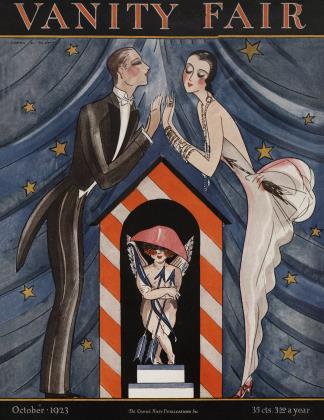Sign In to Your Account
Subscribers have complete access to the archive.
Sign In Not a Subscriber?Join NowThe Rise of Eugene O'Neill
A Comment Upon This Dramatic Phenomenon
KENNETH MACGOWAN
A YEAR ago Eugene O'Neill was only a name, though a very important name, to the theaterman and the playgoer of Europe. Today the work of America's one outstanding dramatist is more or less familiar from Ixmdon to Budapest and from Stockholm to Paris. The first of his plays to be acted outside America were given by a tinytheater on the outskirts of London which corresponds in a way to the playhouse of the Provincetown Players where O'Neill first won fame. This is the Everyman Theatre of Hampstead where Norman MacDermott presented the tense two-act drama, Different, and the playlet Ile. Now O'Neill moves down to Piccadilly with Anna Christie, just as he moved up to Broadway with The Emperor Jones, and the result is a far greater triumph. The first-nighters of London raised a rumpus over the play and over Pauline Lord which might be heard in the theatrical circles of Budapest.
There, in the capital of Hungary, The Hairy Ape or The Emperor Jones may already be hearing the echo of the British applause. For O'Neill has held for some time contracts signed by certain central Europeans for the rights to those plays in both Hungary and Czecho-Slovakia. These two pieces—one of them an essayin out and out expressionism, and the other verging closely on that new form— seem likely to break the road for American drama everywhere but in London. Max Reinhardt, the distinguished German producer, who visited New York this spring in preparation for his production of The Miracle here in the fall, saw O'Neill, talked long with him, and asked permission to mount these two plays in Vienna at his first opportunity. He contracted also for the production of Anna Christie at the Deutsches Theater in Berlin, his old theater over which he still keeps a fatherly eye.
The Emperor Jones and The Hairy Ape are also the choice of G6mier for production at the Odeon, in Paris. At first LeSinge Vein was to serve as in introduction of O'Neill to France; but, for some reason or other—perhaps the fact that the Odeon is a government-endowed theater, and The Hairy Ape has a good deal to sayabout the industrial underdog —this piece has been postponed till the fall, and, at last accounts, Gemier was ready-ing L'Empcreur Jones—or is it to be Jones, TEmpercur?—for spring production over the Seine. A negro actor from the French possessions in Africa will play Brutus Jones. What a first name for the Gallic tongue to soften! Sooner or later— depending on the length of run of Anna Christie in London—the British capital will see The Hairy Ape and The Emperor Jones. Meantime the latter playgoes into rehearsal at the Royal Swedish Theater, Stockholm.
CRITICS of slightly graying years are comically loathe to give O'Neill more than the title of the leading play-wright of the younger generation. The astonishing rapidity with which his reputation has spread up and down Europe may bring some of them to realize that O'Neill not only outdistances Augustus Thomas, Langdon Mitchell, Owen Davis, Edward Sheldon, and other living representatives of the theater of ten years ago, but that the solidity and extent of his accomplishment place him above Clyde Fitch and even William Vaughan Moody, of reverenced memory, author of The Great Divide.
Two new plays by O'Neill threaten to bear down the resistance of even the most conservative of critics. Arthur Hopkins now has in his desk dramas as far apart in subject matter and treatment as The Emperor Jones and Diff'rent. One is The Fountain, an imaginative and almost allegorical play with Ponce de Leon for its central figure, and all the materialism and glow of burgeoning Spain for its background. Robert Edmond Jones has been in the south-west corner of Europe seeking color and atmosphere for the settings, and Hopkins is on a still hunt for an actor able to range from the buoy-ant youth of Ponce before Grenada to his death in the West Indies. The other play, Welded, is a taut and torturing drama of the inescapable conflict between a man and a wife who love with the consuming passion of egoists. Its structure is both ingenious and simple, and its development of extraordinary itensity—so far as one mayjudge from a first reading of the manuscript.
 View Full Issue
View Full Issue












Subscribers have complete access to the archive.
Sign In Not a Subscriber?Join Now